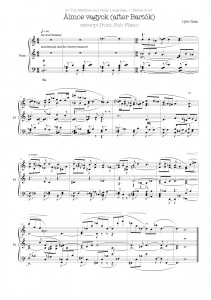On his birthday my friend Tim called me to talk about Philip Langridge, who had just died from cancer. I was in a cheery mood and there was no reason not to stay that way; when people die, they just disappear from our reality, but nothing’s really happened to them. They’ve just become unfettered to rejoin an eternal, infinite sentient energy. Tim and I reminisced about the one time he and Philip and I were together, which was the Musica Viva Chamber Music Festival in 2008. Philip was in bliss, confessing that chamber music, not opera, was his true first love.
Tim and I turned our conversation to the 2011 Musica Viva Festival, which he was currently programming and will possibly feature the complete string quartets of Bartók. It will be the first time in 15 years that these will be played as a cycle in Sydney. I love these works with all my heart. The Fourth was written for the Pro Arte Quartet, who were my teachers (or to be precise, I was taught by the 1980s membership, but it had an unbroken lineage to the 1927 incarnation that Bartók wrote for).
The appearance of Bartók in that conversation made me smile. It was a synchronicity, reinforcing a Hungarian thread that had started to show up insistently in my present reality. It began at the end of last year when I made a new friend, Carl, who stands out amongst my friends for not using computers or mobile phones. Carl just loves Bartók’s music and he reignited my interest, leading me to refamiliarize myself with it and to read Danielle Fosler-Lussier’s fascinating book on the treatment of Bartók’s music in Cold War Europe.
Separately, I’ve also been reading psychologist Mihaly Csikszentmihalyi, who postulates a theory of a ‘flow state of mind’ in which maximum problem-solving occurs; that optimal state of concentration is well-known to artists and creative professionals, to athletes, speakers and basically anyone who can meet a high challenge with high skill. As his name suggests, this now-American scientist emigrated from Hungary.
I recognized that the mischievous universe was trying to engage me, playfully piling up synchronicities to get my attention. The fact that they’re Hungarian is beside the point – synchronicities are simply there to say ‘follow me’, and when I do, I arrive at where ‘the flow’ is.
So after I finished my call with Tim, I followed the thread. I sat down, reached for some Bartók and wrote this 2-minute piece. I built the composition from two pieces that were at hand: the opening of Bartók’s String Quartet No. 3 and the 26th piece (‘Dance with me’) from A Gyermekeknek (‘For Children’). It still awes me (though it shouldn’t, I’ve witnessed it often enough) as to how fulfilling it is to write a piece while in the flow. Now as I sit back and regard with curiosity this piece built by the crossing of Hungarian folksism and Hungarian avant-gardism, I acknowledge the beauty I was meant to discover.
The next day, I started a 3-day stint as a member of crew for Chris Howard, a brilliant coach who’s played a big role in awakening and contextualizing my entrepreneurial spirit. It was Chris who first taught me about Csikszentmihalyi. The first fellow team member I met was a big-hearted and vivacious young woman who gave me a warm compliment about my t-shirt. Her name was Viktoria and she just happened to be – yes, Hungarian. When the universe wants to play, it’s like a big, affectionate bullmastiff bounding at you. It’s best to just laugh, flex and roll with it because really, you have no choice.
I took the title Álmos vagyok from yet another Bartók composition for children, this time a song. “Álmos vagyok” means “I am sleepy”. I found myself wondering if Philip Langridge was getting sleepy at the time he and I last spoke, and if he knew it would soon be time to go close his eyes.
Carl phoned as I was writing this note.
Lyle Chan Music
17 Mar 2010


